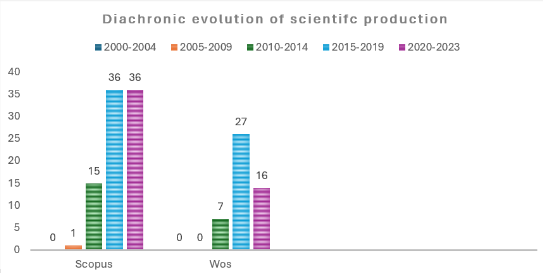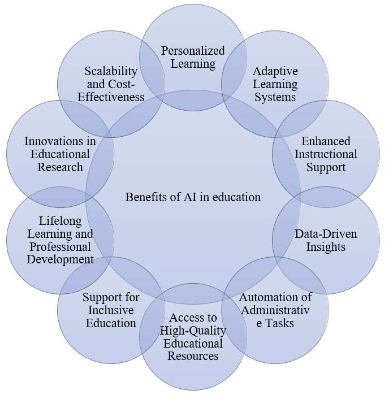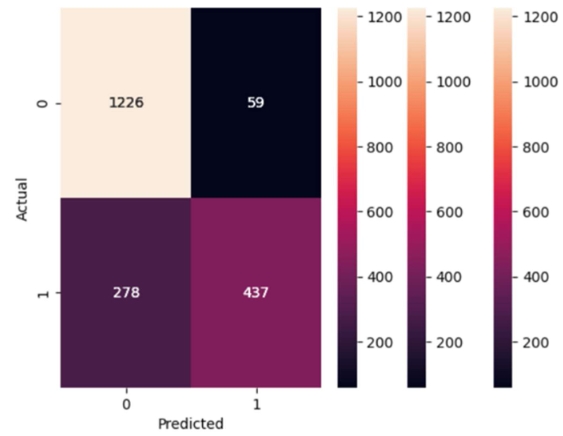Navigating the ethical terrain of AI in higher education: Strategies for mitigating bias and promoting fairness
Abstract
Artificial intelligence (AI) and machine learning (ML) are transforming higher education by enhancing personalized learning and academic support, yet they pose significant ethical challenges, particularly in terms of inherent biases. This review critically examines the integration of AI in higher education, underscoring the dual aspects of its potential to innovate educational paradigms and the essential need to address ethical implications to avoid perpetuating existing inequalities. The researchers employed a methodological approach that analyzed case studies and literature as primary data collection methods, focusing on strategies to mitigate biases through technical solutions, diverse datasets, and strict adherence to ethical guidelines. Their findings indicate that establishing an ethical AI environment in higher education is imperative and involves comprehensive efforts across policy regulation, governance, and education. The study emphasizes the significance of interdisciplinary collaboration in addressing the complexities of AI bias, highlighting how policy, regulation, governance, and education play pivotal roles in creating an ethical AI framework. Ultimately, the paper advocates for continuous vigilance and proactive strategies to ensure that AI contributes positively to educational settings, stressing the need for robust frameworks that integrate ethical considerations throughout the lifecycle of AI systems to ensure their responsible and equitable use.
References
[1]Bisen IE, Arslan EA, Yildirim K, et al. Artificial Intelligence and machine learning in higher education. In: Machine Learning Approaches for Improvising Modern Learning Systems. IGI Global; 2021. pp. 1-17.
[2]Rahiman HU, Kodikal R. Revolutionizing education: Artificial intelligence empowered learning in higher education. Cogent Education. 2023; 11(1). doi: 10.1080/2331186x.2023.2293431
[3]Yildirim Y, Arslan EA, Yildirim K, et al. Reimagining Education with Artificial Intelligence. Eurasian Journal of Higher Education. 2021; 2(4): 32-46. doi: 10.31039/ejohe.2021.4.52
[4]Alqahtani T, Badreldin HA, Alrashed M, et al. The emergent role of artificial intelligence, natural learning processing, and large language models in higher education and research. Research in Social and Administrative Pharmacy. 2023; 19(8): 1236-1242. doi: 10.1016/j.sapharm.2023.05.016
[5]Kuleto V, Ilić M, Dumangiu M, et al. Exploring Opportunities and Challenges of Artificial Intelligence and Machine Learning in Higher Education Institutions. Sustainability. 2021; 13(18): 10424. doi: 10.3390/su131810424
[6]Alam A. Harnessing the Power of AI to Create Intelligent Tutoring Systems for Enhanced Classroom Experience and Improved Learning Outcomes. In: Intelligent Communication Technologies and Virtual Mobile Networks. Springer Nature Singapore; 2023. pp. 571-591.
[7]Pedró F. Applications of Artificial Intelligence to higher education: possibilities, evidence, and challenges. IUL Research. 2020; 1(1): 61-76. doi: 10.57568/iulres.v1i1.43
[8]Sajja R, Sermet Y, Cikmaz M, et al. Artificial Intelligence-Enabled Intelligent Assistant for Personalized and Adaptive Learning in Higher Education. arXiv. 2023; arXiv:2309.10892.
[9]Xu W, Meng J, Raja SKS, et al. Artificial intelligence in constructing personalized and accurate feedback systems for students. International Journal of Modeling, Simulation, and Scientific Computing. 2023; 14(01): 2341001.
[10]Miao F, Holmes W, Huang R, et al. AI and Education: A Guidance for Policymakers. UNESCO Publishing; 2021.
[11]Yang C, Huan S, Yang Y. A Practical Teaching Mode for Colleges Supported by Artificial Intelligence. International Journal of Emerging Technologies in Learning (iJET). 2020; 15(17): 195. doi: 10.3991/ijet.v15i17.16737
[12]Ali M, Abdel-Haq MK. Bibliographical analysis of artificial intelligence learning in Higher Education: is the role of the human educator and educated a thing of the past? In: Fostering Communication and Learning with Underutilized Technologies in Higher Education. IGI Global; 2021. pp. 36-52.
[13]Tiwari CK, Bhat MohdA, Khan ST, et al. What drives students toward ChatGPT? An investigation of the factors influencing adoption and usage of ChatGPT. Interactive Technology and Smart Education. 2023; 21(3): 333-355. doi: 10.1108/itse-04-2023-0061
[14]Popenici SAD, Kerr S. Exploring the impact of artificial intelligence on teaching and learning in higher education. Research and Practice in Technology Enhanced Learning. 2017; 12(1). doi: 10.1186/s41039-017-0062-8
[15]Zawacki-Richter O, Marín VI, Bond M, et al. Systematic review of research on artificial intelligence applications in higher education—where are the educators? International Journal of Educational Technology in Higher Education. 2019; 16(1): 1-27.
[16]Maphosa V, Maphosa M. Artificial intelligence in higher education: a bibliometric analysis and topic modeling approach. Applied Artificial Intelligence. 2023; 37(1). doi: 10.1080/08839514.2023.2261730
[17]Ntoutsi E, Fafalios P, Gadiraju U, et al. Bias in data‐driven artificial intelligence systems—An introductory survey. WIREs Data Mining and Knowledge Discovery. 2020; 10(3). doi: 10.1002/widm.1356
[18]Hall P, Ellis D. A systematic review of socio-technical gender bias in AI algorithms. Online Information Review. 2023; 47(7): 1264-1279. doi: 10.1108/oir-08-2021-0452
[19]Kordzadeh N, Ghasemaghaei M. Algorithmic bias: review, synthesis, and future research directions. European Journal of Information Systems. 2021; 31(3): 388-409. doi: 10.1080/0960085x.2021.1927212
[20]Leavy S. Gender bias in artificial intelligence: The need for diversity and gender theory in machine learning. In: Proceedings of the 1st International Workshop on Gender Equality in Software Engineering; 28 May 2018; Gothenburg, Sweden. pp. 14-16.
[21]Yapo A, Weiss J. Ethical Implications of Bias in Machine Learning. In: Proceedings of the 51st Hawaii International Conference on System Sciences; 3-6 January 2018; Hilton Waikoloa Village, Hawaii, USA. pp. 5365-5372. doi: 10.24251/hicss.2018.668
[22]Mehrabi N, Morstatter F, Saxena N, et al. A Survey on Bias and Fairness in Machine Learning. ACM Computing Surveys. 2021; 54(6): 1-35. doi: 10.1145/3457607
[23]Zhou KZ, Cao J, Yuan X, et al. “I’m Not Confident in Debiasing AI Systems Since I Know Too Little”: Teaching AI Creators About Gender Bias Through Hands-on Tutorials. arXiv. 2023; arXiv:2309.08121.
[24]Roshanaei M. Towards best practices for mitigating artificial intelligence implicit bias in shaping diversity, inclusion and equity in higher education. Education and Information Technologies. 2024; 1-26. doi: 10.1007/s10639-024-12605-2
[25]Broussard M. More than a Glitch: Confronting Race, Gender, and Ability Bias in Tech. MIT Press; 2023.
[26]Jackson S, Panteli N. Trust or mistrust in algorithmic grading? An embedded agency perspective. International Journal of Information Management. 2023; 69: 102555. doi: 10.1016/j.ijinfomgt.2022.102555
[27]Slimi Z, Carballido BV. Navigating the Ethical Challenges of Artificial Intelligence in Higher Education: An Analysis of Seven Global AI Ethics Policies. TEM Journal. 2023; 12(2): 590-602. doi: 10.18421/tem122-02
[28]Le-Nguyen HT, Tran TT. Generative AI in Terms of Its Ethical Problems for Both Teachers and Learners: Striking a Balance. In: Generative AI in Teaching and Learning. IGI Global; 2023. pp. 144-173.
[29]Schwartz R, Vassilev A, Greene K, et al. Towards a Standard for Identifying and Managing Bias in Artificial Intelligence. NIST Special Publication; 2022.
[30]Hersh RH, Merrow J. Declining by Degrees: Higher Education at Risk. St. Martin’s Press; 2015.
[31]Mashhadi A, Zolyomi A, Quedado J. A Case Study of Integrating Fairness Visualization Tools in Machine Learning Education. In: Proceedings of the CHI Conference on Human Factors in Computing Systems Extended Abstracts; 29 April-5 May 2022; New Orleans, LA, USA. pp. 1-7. doi: 10.1145/3491101.3503568
[32]Islam SR, Russell I, Eberle W, et al. Incorporating the Concepts of Fairness and Bias into an Undergraduate Computer Science Course to Promote Fair Automated Decision Systems. In: Proceedings of the 53rd ACM Technical Symposium on Computer Science Education V2; 2-5 March 2022; Providence, RI, USA. pp. 1075-1075. doi: 10.1145/3478432.3499043
[33]Borenstein J, Howard A. Emerging challenges in AI and the need for AI ethics education. AI and Ethics. 2020; 1(1): 61-65. doi: 10.1007/s43681-020-00002-7
[34]Aleven V, Baraniuk R, Brunskill E, et al. Towards the Future of AI-Augmented Human Tutoring in Math Learning. In: International Conference on Artificial Intelligence in Education. Springer Nature Switzerland; 2023. pp. 26-31.
[35]Giani MS, Walling D. Will I Get In? Using Predictive Analytics to Develop Student-Facing Tools to Estimate University Admissions Decisions. Journal of College Access. 2020; 5(1): 4.
[36]Smithers L. Predictive analytics and the creation of the permanent present. Learning, Media and Technology. 2022; 48(1): 109-121. doi: 10.1080/17439884.2022.2036757
[37]Umer R, Susnjak T, Mathrani A, et al. Current stance on predictive analytics in higher education: opportunities, challenges and future directions. Interactive Learning Environments. 2021; 31(6): 3503-3528. doi: 10.1080/10494820.2021.1933542
[38]Fuller K, Lupton-Smith C, Hubal R, et al. Automated Analysis of Preceptor Comments: A Pilot Study Using Sentiment Analysis to Identify Potential Student Issues in Experiential Education. American Journal of Pharmaceutical Education. 2023; 87(9): 100005. doi: 10.1016/j.ajpe.2023.02.005
[39]Beal CR. AnimalWatch: An intelligent tutoring system for algebra readiness. In: International Handbook of Metacognition and Learning Technologies. Springer; 2013. pp. 337-348.
[40]Chu CH, Nyrup R, Leslie K, et al. Digital Ageism: Challenges and Opportunities in Artificial Intelligence for Older Adults. The Gerontologist. 2022; 62(7): 947-955. doi: 10.1093/geront/gnab167
[41]Tomalin M, Byrne B, Concannon S, et al. The practical ethics of bias reduction in machine translation: Why domain adaptation is better than data debiasing. Ethics and Information Technology. 2021; 23: 419-433. doi: 10.1007/s10676-021-09583-1
[42]Li C, Xing W. Revealing factors influencing students’ perceived fairness: A case with a predictive system for math learning. In: Proceedings of the Ninth ACM Conference on Learning@ Scale; 1-3 June 2022; New York City, NY, USA. pp. 409-412.
[43]Fu R, Huang Y, Singh PV. AI and algorithmic bias: Source, detection, mitigation and implications. In: Detection, Mitigation and Implications. 2020.
[44]Dignum V. Relational artificial intelligence. arXiv. 2022; arXiv:2202.07446.
[45]Woodgate J, Ajmeri N. Macro ethics for governing equitable sociotechnical systems. In: Proceedings of the 21st International Conference on Autonomous Agents and Multiagent Systems (AAMAS); 9-13 May 2022; Online Conference. pp. 1824-1828.
[46]Guan H, Dong L, Zhao A. Ethical Risk Factors and Mechanisms in Artificial Intelligence Decision Making. Behavioral Sciences. 2022; 12(9): 343. doi: 10.3390/bs12090343
[47]Köbis L, Mehner C. Ethical questions raised by AI-supported mentoring in higher education. Frontiers in Artificial Intelligence. 2021; 4: 624050.
[48]Bendechache M, Tal I, Wall P, et al. AI in My Life: AI, Ethics & Privacy Workshops for 15-16-Year-Olds. In: Proceedings of the Companion Publication of the 13th ACM Web Science Conference; 21-25 June 2021; Online Conference. pp. 34-39.
[49]Benhayoun L, Lang D. Does higher education properly prepare graduates for the growing artificial intelligence market? Gaps’ identification using text mining. Human Systems Management. 2021; 40(5): 639-651. doi: 10.3233/hsm-211179
[50]Holmes W, Porayska-Pomsta K, Holstein K, et al. Ethics of AI in Education: Towards a Community-Wide Framework. International Journal of Artificial Intelligence in Education. 2021; 32(3): 504-526. doi: 10.1007/s40593-021-00239-1
[51]Zytko D, Wisniewski P, Guha S, et al. Participatory Design of AI Systems: Opportunities and Challenges Across Diverse Users, Relationships, and Application Domains. In: Proceedings of the CHI Conference on Human Factors in Computing Systems Extended Abstracts; 29 April–5 May 2022; New Orleans, LA, USA. doi: 10.1145/3491101.3516506
[52]Goodyear P. Educational design and networked learning: Patterns, pattern languages and design practice. Australasian Journal of Educational Technology. 2005; 21(1). doi: 10.14742/ajet.1344
[53]Triantafyllakos G, Palaigeorgiou G, Tsoukalas IA. Designing educational software with students through collaborative design games: The We! Design & Play framework. Computers & Education. 2011; 56(1): 227-242.
[54]Hossain S, Ahmed SI. Towards a New Participatory Approach for Designing Artificial Intelligence and Data-Driven Technologies. arXiv. 2021; arXiv:2104.04072.
[55]Jacobs M, Kurtz C, Simon J, et al. Value Sensitive Design and power in socio-technical ecosystems. Internet Policy Review. 2021; 10(3). doi: 10.14763/2021.3.1580
[56]Umbrello S, Van de Poel I. Mapping value sensitive design onto AI for social good principles. AI and Ethics. 2021; 1(3): 283-296.
[57]Gerdes A. A participatory data-centric approach to AI Ethics by Design. Applied Artificial Intelligence. 2021; 36(1). doi: 10.1080/08839514.2021.2009222
[58]Kasif S. Artificial Tikkun Olam: AI Can Be Our Best Friend in Building an Open Human-Computer Society. arXiv. 2020; arXiv:2010.12015.
[59]Nitta I, Ohashi K, Shiga S, et al. AI Ethics Impact Assessment based on Requirement Engineering. In: Proceedings of the 2022 IEEE 30th International Requirements Engineering Conference Workshops (REW); 15-19 August 2022; Melbourne, Australia. pp. 152-161. doi: 10.1109/rew56159.2022.00037
[60]Metcalf J, Moss E, Watkins EA, et al. Algorithmic Impact Assessments and Accountability. In: Proceedings of the 2021 ACM Conference on Fairness, Accountability, and Transparency. 3-10 March 2021; Online Conference. pp. 735-746. doi: 10.1145/3442188.3445935
[61]Beutel A, Chen J, Doshi T, et al. Putting fairness principles into practice: Challenges, metrics, and improvements. In: Proceedings of the 2019 AAAI/ACM Conference on AI, Ethics, and Society; 27-28 January 2019; Honolulu, HI, USA. pp. 453-459.
[62]Broder RS, Berton L. Performance analysis of machine learning algorithms trained on biased data. In: Anais do XVIII Encontro Nacional de Inteligência Artificial e Computacional. SBC; 2021. pp. 548-558.
[63]Han X, Shen A, Li Y, et al. FairLib: A Unified Framework for Assessing and Improving Fairness. In: Che W, Shutova E (editors). Proceedings of the 2022 Conference on Empirical Methods in Natural Language Processing: System Demonstrations. Association for Computational Linguistics; 2022. doi: 10.18653/v1/2022.emnlp-demos.7
[64]Gupta A, Wright C, Ganapini MB, et al. The State of AI Ethics Report. arXiv. 2021; arXiv:2108.03929.
[65]Patel K. Ethical Reflections on Data-Centric AI: Balancing Benefits and Risks. International Journal of Artificial Intelligence Research and Development. 2024; 2(1): 1-17.
[66]Papamitsiou Z, Economides AA. Learning analytics and educational data mining in practice: A systematic literature review of empirical evidence. Journal of Educational Technology & Society. 2014; 17(4): 49-64.
[67]Gellai DB. Enterprising Academics: Heterarchical Policy Networks for Artificial Intelligence in British Higher Education. ECNU Review of Education. 2022; 6(4): 568-596. doi: 10.1177/20965311221143798
[68]Nelson LK, Zippel K. From Theory to Practice and Back: How the Concept of Implicit Bias was Implemented in Academe, and What this Means for Gender Theories of Organizational Change. Gender & Society. 2021; 35(3): 330-357. doi: 10.1177/08912432211000335
[69]Mohammed PS, Nell’Watson E. Towards inclusive education in the age of artificial intelligence: Perspectives, challenges, and opportunities. In: Knox J, Wang Y, Gallagher M (editors). Artificial Intelligence and Inclusive Education: Speculative Futures and Emerging Practices. Springer; 2019. pp. 17-37. doi: 10.1007/978-981-13-8161-4_2
Copyright (c) 2024 Emily Barnes, James Hutson

This work is licensed under a Creative Commons Attribution 4.0 International License.









